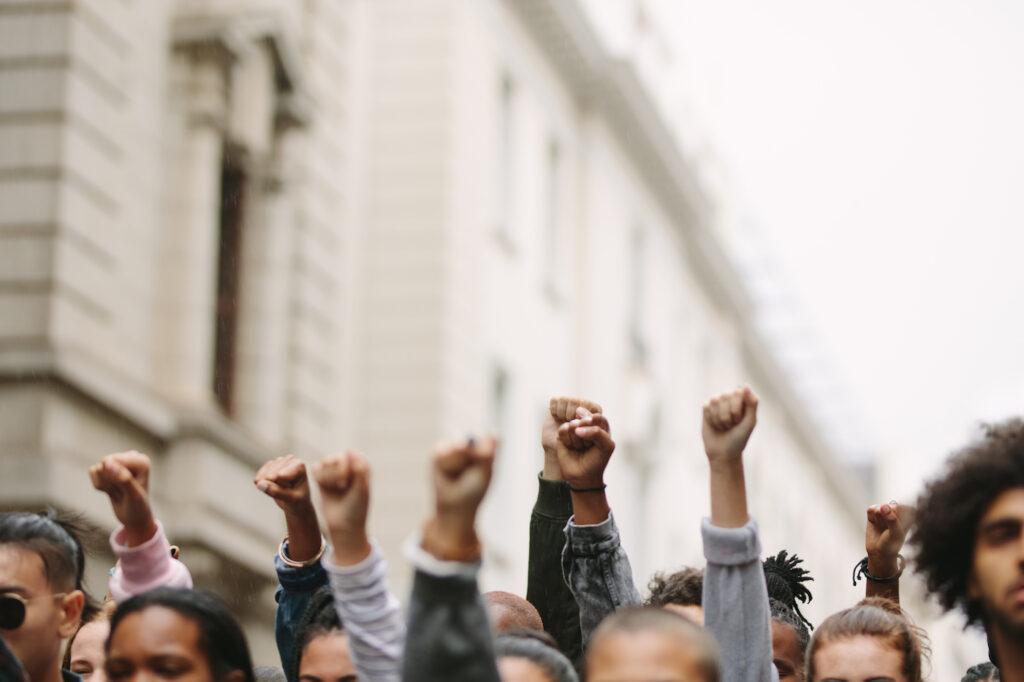Editor’s Note: Today’s essay is Managing Editor Elayne Allen’s reply to David Corey’s “A Coalition of the Sensible: What’s Wrong with ‘The New Right.’” These essays explore what a principled and sober approach to politics might look like in our current climate of escalating discord.
David Corey (my former professor!) has written an important essay for Public Discourse, “A Coalition of the Sensible: What’s Wrong with ‘The New Right.’’’ He calls for a rejection of the Schmittian impulse to view politics as war. He offers sound advice on recalibrating our expectations of what politics can accomplish in our pluralistic society.
I want to build on Corey’s observations and arguments by analyzing our polarization and conflicts from another angle—the religious basis for our disagreements. Viewed as clashes among various faiths, the intense fervor that characterizes our disagreements begins to make more sense. There’s been a spiritual vacuum left behind by the decline in traditional religion. In its place are politically polarized pseudo-religions—ones that have no God, nor any teachings that transcend the temporal realm, and that rely on temporal power to achieve their aims. For these pseudo-religions, secular, immanent, and political goals take on a theological status, and offer spiritual consolation for modern souls.
Viewed as clashes among various faiths, the intense fervor that characterizes our disagreements begins to make more sense.
Start your day with Public Discourse
Sign up and get our daily essays sent straight to your inbox.Human beings cannot help but worship. And whom or what they worship has profound consequences not only for their own eternity, but for their civic neighbors and their political community. Corey has shown that we must learn to live peaceably together amid profound disagreements. To do so, paradoxically, means that religions—authentic religions that offer an account of God, the cosmos, and human beings—should aspire to social influence. This doesn’t mean that religionists should seek to vanquish or coerce opponents; rather, it means religions self-consciously should try to shape public life in a way that helps faith flourish. As Ross Douthat has said, this strategy doesn’t seek “formal power” but “a power within a pluralist context that would be exercised more indirectly but remain real power all the same.” This “soft power” respects the rights and diverse commitments of one’s neighbors, and accepts rather than trying to overcome the constraints of pluralism.
A coalition of the sensible, in other words—within the limits of pluralistic politics—should aspire to gain soft power for religious beliefs, practices, and institutions that are truly religious. This soft power is especially compatible with the character of Christianity, which teaches that faith can’t be coerced but recognizes that external influences and nudges can help create the habits of devotion.
When genuine religion thrives, there’s less room or need for the totalizing ambitions that counterfeit faiths tend to adopt. Even those who aren’t religious themselves but are concerned about the far left and far right should at least seek safeguards for religion, because the loss of genuine religion has led to the spiritualization of politics—often without much forgiveness for dissidents.
The Religious Vacuum
I am far from the first to note that politics, especially on the far left, has taken on a spiritual hue. In the Summer 2021 issue of National Affairs, James Patterson wrote: “Wokeness has an unconventional understanding of divinity that tends to disguise its religiosity from those accustomed to monotheism; . . . identity is the source of divinity. Yet individuals are not divine on their own; they only participate in the divinity found in shared group identities.” One’s identity within the social strata is ultimate, inerrant, and therefore untouchable.
This sense of self longs for social validation, which is why it seeks influence in our institutions. Mary Eberstadt has also noticed these trends. In First Things last year, she wrote: “[P]olitical identity has become a substitute for familial and communal bonds. Both are rooted in a fury at creation itself—an anger at the disruption of the natural order, which the creature now claims the right to re-order.” Those untethered from familial, religious, and communal contexts no longer have a plausible understanding of who, exactly, they are. These people “are victims of the same revolution that undermined their churches and uprooted their communities. From that wreckage, identity politics sends up a howl for a world more ordered, protective, and connected than many now know,” Eberstadt observes.
People are no longer brought up with a firm sense of self, nor are they catechized in religions that answer their existential needs. Adrift, lonely, and devoid of a firm sense of purpose, they find today’s politics is their lifeline: it offers them a life’s project of making the world more just, humane, and equitable. In fact, many of their goals are worthwhile. But the ruthlessness, frenzy, and fervor with which many pursue it exceed the loving passion that normal reform efforts involve. This is because their projects are fulfilling a spiritual need. Patterson writes,
The afterlife for the woke is not one where the soul awaits the judgment of creation. Rather, like the pagan Romans, the woke find life after death through fama, or the renown due to a person who lived a glorious life. Similarly, fate for the woke seems to lie in the continued caste struggle.
For some, achieving glory in this life is all that they have.
This is no less true of the post-Christian right. There repaganization on the right pushes for vitalism, the celebration and worship of raw life in all its chaos, glory, and even violence. It’s the inverse of the far-left ideology: hierarchical (as opposed to egalitarian) and hyper-masculine (as opposed to hyper-feminine). The neo-pagan right claims nature, especially biology, as its authority rather than one’s subjectively determined sense of identity.
The far left and far right are providing a place for the souls wandering in a civilization that’s become barren of meaning. Without an afterlife, eternity, or divine providence to make sense of one’s place in the cosmos, we’re on our own. In the 1970s and ’80s, fewer than 10 percent of Americans identified as “nones”—people who are atheists, agnostic, or who apparently have no religious views. Now one quarter of Americans are nones. Even if you didn’t really believe in God a few decades ago, thick local communities provided a sense of self and belonging that buffered you from the ontological wilderness of default agnosticism. But in our isolated and digital moment, the radical left and right are stepping in where faith, family, and local communities once did. Radical politics serves as the cathedral, hearth, and haven for the spiritually homeless.
Revitalizing Faith
Again, this is something many others know and have noted. But I’d suggest to anyone who finds Corey’s principles for a coalition of the sensible appealing that they cannot be achieved without religion, and by extension families and communities, once again playing an important role in society. This might seem to contradict what Corey claims: after all, doesn’t pluralism preclude acknowledging that religion has any special place in society? Don’t we have to be neutral on questions of ultimate importance in the public square in order to get along and not kill each other?
This view mistakes what pluralism actually is. Pluralism is an irreducible, sociological fact of American life. It is not a set of norms that requires perfect neutrality in public spaces; instead, it creates parameters around what’s politically possible amid profoundly diverse views about first principles. In our secular and pluralistic age, a sensible politics recognizes that moral consensus is impossible, as Corey notes; and pursuing perfect consensus would eventually require politics to become a blunt coercive instrument, no longer an arena of competition and deliberation.
Pluralism is an irreducible, sociological fact of American life. It is not a set of norms that requires perfect neutrality in public spaces; instead, it creates parameters around what’s politically possible amid profoundly diverse views about first principles.
So without seeking a confessional state, what does it look like for religion to wield influence? First, it means rejecting the idea that religion is a purely private matter that has no relevance in the public square. Above all, religious influence focuses less on rigging laws in order to achieve political power and more on the internal revitalization of religion, and on creating conditions that are most conducive to that revitalization.
This is the subject of Ross Douthat’s 2022 First Things essay, “A Gentler Christendom.” Douthat looks at the shifting religious influences in the twentieth century, and observes that “Post-Protestant Gnosticism” is the “religious hegemon” in America. By religious hegemon, Douthat means the religious ideology that wields the most influence and sits at the top of the cultural hierarchy, with gatekeeping institutions. Post-Protestant Gnosticism started its ascent gently, but has become more exacting, as we saw above in my discussion of the radical left.
How can traditional religions recover their influence? Douthat concludes: “Religious power wielded wisely and mildly and indirectly, with due respect to liberty and diversity and a focus first on the faith’s internal health and zeal, can sustain a religious ascendancy for many generations.” Therefore the first thing for those who belong to traditional faiths is to focus on internal revitalization and health. In practice, this simply means that the faithful should spend less time online fretting over politics, and instead invest in their parishes, synagogues, and churches. It also means a renewed focusing on teaching and catechizing, so that the faithful can face the immense pressure to profess a political faith rather than a theological one after they leave home.
But prioritizing internal health doesn’t mean retreat from the public square. Wise, mild, and indirect power in some cases might look like creating parallel institutions—for example, creating religious charter schools to exist alongside public schools. In other cases, it will mean trying to stymie extreme political views from reshaping socially important institution such as medicine, law, and higher education. Again, though, pursuing “soft power” for religions doesn’t mean seeking the power of the state, or even the influence of private institutions to drive out dissent or compel agreement. It just means intentionally creating conditions for authentic religions to flourish without seeking to dominate those who differ.
Religiosity will rear its head in one way or another. If you are religious, you’ve wagered your life on particular and exclusive claims about who God is, what kind of world we’re in, and the kind of creatures we are. These stakes are impossibly high, and sensible political communities will vigilantly safeguard the sacred from the encroachment of politics.














